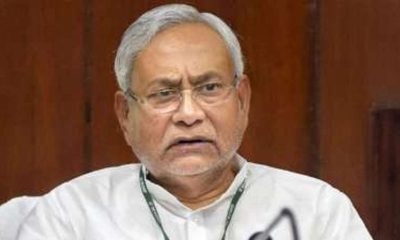[vc_row][vc_column][vc_column_text]The Supreme Court today (Friday, Jan 4) said that an appropriate bench constituted by it will pass order on January 10 for future course of hearing in the Ram Janmabhoomi-Babri Masjid land dispute case.
“Further orders will be passed by an appropriate bench on January 10 for fixing the date for hearing the matter,” a bench comprising Chief Justice of India (CJI) Ranjan Gogoi and Justice SK Kaul said.
In a hearing that lasted less than half a minute, according to media reports, the CJI, as soon as the matter came up, said it is the Ram Janmabhoomi-Babri Masjid case and passed the order. Senior advocates Harish Salve and Rajeev Dhavan, appearing for different parties, did not even get the opportunity to make any submission.
Now, a three-member bench will be set up for taking forward the Ayodhya land dispute case in which as many as 14 appeals were filed against the 2010 Allahabad High Court judgement, delivered in four civil suits, that the 2.77-acre land be partitioned equally among the three parties – the Sunni Waqf Board, the Nirmohi Akhara and Ram Lalla.
On October 29 last year, the bench of CJI Ranjan Gogoi and Justices SK Kaul and KM Joseph had refused to grant the Uttar Pradesh government counsel’s request for urgent hearing of the appeals in the case. The bench had ordered that the appeals be listed in the first week of January before an “appropriate bench” which said would decide the date of hearing.
Later, an application was moved for according an urgent hearing by advancing the date, but the top court had rejected the plea, saying it had already passed an order on October 29 relating to the hearing of the matter.
The plea for early hearing was moved by the Akhil Bharat Hindu Mahasabha (ABHM) which is one of the respondents in the appeal filed by legal heirs of M Siddiq, one of the original litigants in the case.
A three-judge bench of the top court had on September 27 last year, by 2:1 majority, refused to refer to a five-judge constitution bench the issue of reconsideration of the observations in its 1994 judgement that a mosque was not integral to Islam. The matter had arisen during the hearing of the Ayodhya land dispute.
The hearing came in the backdrop of various Hindutva organisations raising the pitch on Ayodhya issue, demanding an ordinance to enable early start of construction of Ram temple at the disputed site.
On Tuesday, however, Prime Minister Narendra Modi had said a decision on an ordinance on Ram temple in Ayodhya should come only after the completion of the judicial process.
“Let the judicial process take its own course. Don’t weigh it in political terms. Let the judicial process be over. After the judicial process is over, whatever be our responsibility as government, we are ready to make all efforts,” Modi had said in an interview to ANI broadcast by several TV channels.
BJP’s NDA allies have been pulling in different directions. Shiv Sena has been pressing for Ram temple construction, while Bihar chief minister and JD(U) leader Nitish Kumar as well as Lok Janashakti Party (LJP) chief Ram Vilas Paswan oppose an ordinance or executive order to enable a Ram temple in Ayodhya, saying the Supreme Court decision on the matter should be final.
“Whatever judgement the Supreme Court gives on the Ram temple issue should be accepted by everyone, be it Hindu, Muslim or any other community. When the PM said that we will wait for the Supreme Court judgement, then all ifs and buts should end,” Paswan said, according to news agency PTI.
Paswan added that his Lok Janshakti Party’s stand has been consistent on the issue and that he would not support the ordinance.
Last month, Bihar Chief Minister Nitish Kumar had said the Ram temple issue should be resolved either through a court judgement or mutual agreement among different groups.
“We are committed to the development in Bihar… We are of the opinion that the Ram Mandir matter should be solved through a court decision,” Kumar has said.[/vc_column_text][/vc_column][/vc_row]


 Latest world news16 hours ago
Latest world news16 hours ago
 Latest world news17 hours ago
Latest world news17 hours ago
 Latest world news16 hours ago
Latest world news16 hours ago
 India News16 hours ago
India News16 hours ago
 India News7 hours ago
India News7 hours ago
 Latest world news7 hours ago
Latest world news7 hours ago














